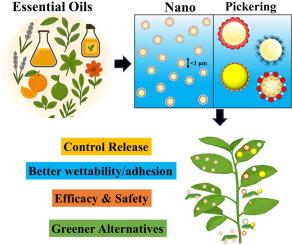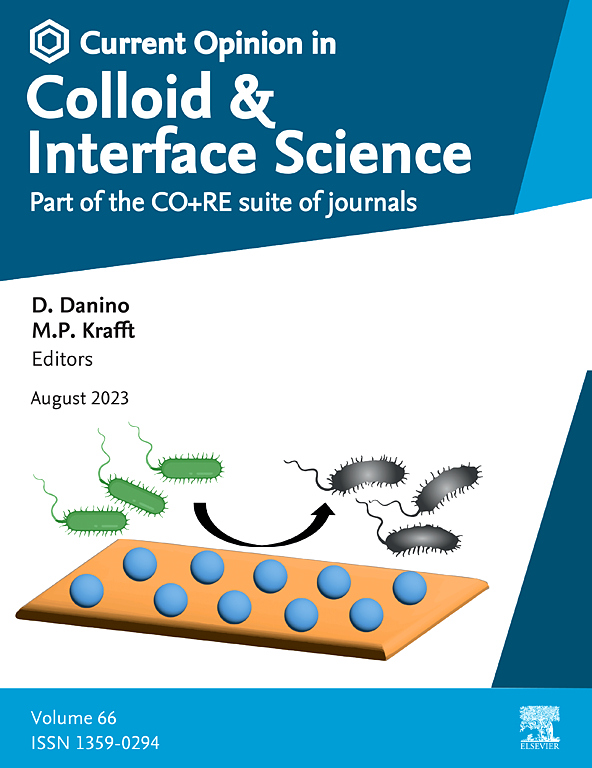精油基乳剂的进展:传统农用化学品的环保替代品
IF 7
2区 化学
Q1 CHEMISTRY, PHYSICAL
Current Opinion in Colloid & Interface Science
Pub Date : 2025-09-11
DOI:10.1016/j.cocis.2025.101964
引用次数: 0
摘要
传统的农用化学品是有效的,但引起了对毒性、持久性和环境安全性的担忧。精油(EOs)由于其固有的抗菌、杀虫和抗氧化特性,已成为天然替代品;然而,它们的高挥发性和不稳定性限制了其直接应用。基于乳化的给药系统,特别是纳米乳液(NEms)和皮克林乳液(PEms),为稳定和控制EOs的释放提供了有效的策略。本文综述了EO乳剂的最新进展,强调了植物表面活性剂、生物表面活性剂和纳米颗粒作为绿色稳定剂,可以单独使用,也可以与传统乳化剂协同使用。胶体稳定性的理论方面,不稳定的机制,静电,空间和非dlvo力的作用进行了讨论。介绍了环氧乙烷乳液作为农用化学品的应用,重点介绍了其改善的润湿性、附着力、耐洗涤性和缓释性。最后,概述了目前在大规模生产、监管标准化和现场验证方面面临的挑战,并提供了将EO乳剂建立为可持续的下一代农用化学品的未来展望。本文章由计算机程序翻译,如有差异,请以英文原文为准。

Advancements in essential oil-based emulsions: Eco-friendly alternatives to conventional agrochemicals
Conventional agrochemicals are effective but raise concerns about toxicity, persistence, and environmental safety. Essential oils (EOs), owing to their inherent antimicrobial, insecticidal, and antioxidant properties, have emerged as natural alternatives; however, their high volatility and instability limit direct application. Emulsion-based delivery systems, particularly nanoemulsions (NEms) and Pickering emulsions (PEms), provide effective strategies for stabilising and controlling the release of EOs. This review highlights recent advances in EO emulsions, emphasising plant-based surfactants, biosurfactants, and nanoparticles as green stabilisers, alone or in synergy with conventional emulsifiers. Theoretical aspects of colloidal stability, mechanisms of destabilisation, and the role of electrostatic, steric, and non-DLVO forces are discussed. Applications of EO emulsions as agrochemicals are presented, focusing on their improved wettability, adhesion, washing resistance, and sustained release. Finally, current challenges in large-scale production, regulatory standardisation, and field-level validation are outlined and provide future perspectives on establishing EO emulsions as sustainable next-generation agrochemicals.
求助全文
通过发布文献求助,成功后即可免费获取论文全文。
去求助
来源期刊
CiteScore
16.50
自引率
1.10%
发文量
74
审稿时长
11.3 weeks
期刊介绍:
Current Opinion in Colloid and Interface Science (COCIS) is an international journal that focuses on the molecular and nanoscopic aspects of colloidal systems and interfaces in various scientific and technological fields. These include materials science, biologically-relevant systems, energy and environmental technologies, and industrial applications.
Unlike primary journals, COCIS primarily serves as a guide for researchers, helping them navigate through the vast landscape of recently published literature. It critically analyzes the state of the art, identifies bottlenecks and unsolved issues, and proposes future developments.
Moreover, COCIS emphasizes certain areas and papers that are considered particularly interesting and significant by the Editors and Section Editors. Its goal is to provide valuable insights and updates to the research community in these specialized areas.

 求助内容:
求助内容: 应助结果提醒方式:
应助结果提醒方式:


